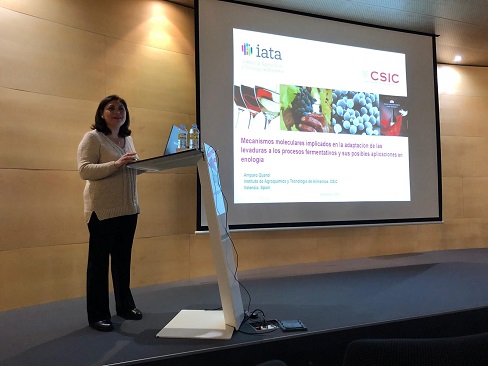
Last 7th of June, Amparo Querol, a doctor from IATA's food biotechnology department, gave the seminar: "Molecular mechanisms involved in the adaptation of yeasts to fermentation processes and their possible applications" at the Institute of Functional Biology and Genomics (IBFG), a joint research centre shared by the Centro Superior de Investigaciones Científicas (CSIC) and the University of Salamanca.
In recent decades the wine producing sector in Spain has experienced great growth, in order to maintain competitiveness and consolidate internationally, the sector must take measures both to adapt to new market demands (lower alcohol content and more fruity aromas) and the challenges related to climate change (lower acidity, increased sugars, tannins and alcohol) that affect the quality of the final product. Although S. cerevisiae is the species most used in oenology, the species S. uvarum, S. kudriavzevii or hybrids present the characteristics demanded by the sector, obtaining wines with lower alcohol content, higher acidity and glycerol content, as well as more aromatic wines, in addition to growing better at lower temperatures than S. cerevisiae. In the present work, the metabolic differences between these species are analyzed through the application of 'omic' methodologies and metabolic fluxes. Finally, some of the applications such as co-inoculation or the formation of hybrids are also analysed.

